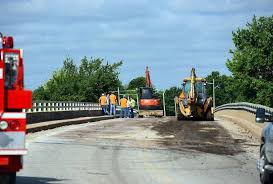
Quite a mess was recently cleaned up on a bridge over the Neosho River in the city of Miami.
It was caused by a city worker hauling bio-solid waste in a truck and the driver smashed into the highway 125 bridge resulting in the spill. The Miami News Herald described it as “slimy, smelly goop” and resulted in the shutdown of the bridge for nearly four hours. The goop also was picked up by some vehicles that drove through the mess.
City Pollution Control Manager Todd Murphree explained to city council members.
“We were hauling it out south of town and for some reason, one of the drivers hit the Riverview Park bridge. The tailgate jarred open and it started spilling sludge out,” said Murphree. “Well, he didn’t notice it until he got clean across the bridge and then we had cars driving through it. It was a mess.”
“We were hauling it out south of town and for some reason, one of the drivers hit the Riverview Park bridge. The tailgate jarred open and it started spilling sludge out,” Murphree said. “Well, he didn’t notice it until he got clean across the bridge, and then we had cars driving through it. It was a mess.”
The goop was part of the city’s efforts to haul loads of bio-solid waste from the City’s Water and Sewer Plant every five to six weeks. As a result of the spill, the Oklahoma Department of Environmental Quality and the Grand River Dam Authority were notified.
“I feel like we cleaned it up the best way we could,” explained Tyler Cline, Miami’s Director of Public Utilities. “We had backhoes come in and scrape it and put it in trucks, and then we hit it with sand and came back with the street sweeper, and what was left, we came back and hosed it down.”
He said the bio-solid sludge material was non-hazardous.
“Basically we digest it and it’s heated for the purpose of killing coliform, then we run it through a press,” he said. “It’s basically kind of a cake and what’s in it is basically it’s fertilizer full of potassium, magnesium, phosphorous – things that you need to grow plants and we apply it to grow grass. It’s really harmless, there are some coliforms in it, some that’s left over.”






